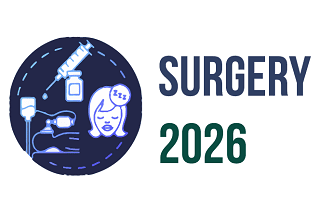4th International Conference on
Surgery and Anesthesia
November 26-27, 2026 | Dubai, UAE

Address: Al Barsha, Al Barsha 1, Dubai, United Arab Emirates
Surgery 2026

Howard University College of Medicine, USA
Title : Cognitive Protection After Cataract Surgery: Examining Ketamine and Dexmedetomidine in the Elderly
Abstract:
Elderly patients undergoing cataract surgery are at increased risk for postoperative cognitive dysfunction (POCD). Previous studies have shown ketamine and dexmedetomidine to have neuroprotective effects. This study aims to examine its association with POCD assessing outcomes postoperatively. Using the TriNetX US Collaborative Network, we analyzed patients aged 65-85 who underwent cataract surgery prior to June 2025. Using ICD-10 codes, POCD was defined as the new onset diagnosis of delirium, dementia, encephalopathy, or depressive disorders at 1 week, 3 months, and 1 year post surgery. Exclusion criteria included pre-existing cognitive impairment, psychiatric illness, psychotropic use, anesthesia allergies, and severe visual impairment. Propensity score matching adjusted for demographics and ASA II/III risk profiles based on common comorbidities. In matched ketamine cohorts (n = 3,733 each), POCD occurred in 0.308% vs. 0.705% at 3 months (p = 0.0182; RR = 2.29) and in 1.315% vs. 2.312% at 1 year (p = 0.0016; RR = 1.76), favoring ketamine. In matched dexmedetomidine cohorts (n = 8,569 each), 1-year POCD was 1.797% vs. 2.389% (p = 0.0094; RR = 1.33), also favoring the treatment group. While short-term effects were not significant, reductions in POCD incidence became apparent by three months and persisted through one year. This supports prior evidence of potential neuroprotective effects of these agents and highlights their relevance in perioperative planning for older adults. Further prospective studies are warranted to validate these associations and clarify underlying mechanisms
Biography:
Edward Arenas completed his MPH at the University of Michigan and has worked previously as an Epidemiologist at the New York State Department of Health and a Program Coordinator at Baylor College of Medicine. He is currently entering his second year of medical school at Howard University College of Medicine
